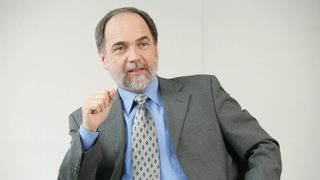How Internet of Things will help us care for an ageing society
We'll all be using GPS-enabled canes in 2063

In June 2013, Japan-based IT services giant Fujitsu launched a research initiative to provide monitoring services and assisted independent living for senior citizens and patients who live in smart houses.
Working with several Irish research institutions over the course of a year, Fujitsu has been using sensors to monitor patients' daily lives.
By gathering data on anything from their physical location to moods and joint movements, doctors have been able to monitor and provide diagnostic support to improve their daily lives.
Dr Joseph Regan, Chief Technology Officer at Fujitsu, talks to TechRadar Pro about the importance of Internet of Things to healthcare research, how product advancement can be help in the area and the role social media networks will play.
TechRadar Pro: Why is it important for companies to begin developing Internet of Things solutions to address healthcare issues?
Joseph Reger: Healthcare is one of the major spending areas of almost any society and country, at least in the Western parts of the world. That's the case in Japan too - particularly the part that has to do with an ageing society and elderly care. Some countries are facing a bigger challenge than others.
Many of the Western European countries - Germany, France and so on - are running into that problem as we speak. Japanese society is already facing that problem and has been for quite a while now, so there is a lot of experience that we have gathered in Japan. Fujitsu is engaging in it for many reasons.
Are you a pro? Subscribe to our newsletter
Sign up to the TechRadar Pro newsletter to get all the top news, opinion, features and guidance your business needs to succeed!
The first is that the time has come for the whole healthcare industry to achieve a higher level of penetration of information and communication technologies. There are very special challenges while we're doing that.
I gave you one very profane challenge that exists, which is that most of the modern day devices are all wireless in some sense.
However, that doesn't mean that you can then without any further thinking, measurements and analysis take them in to the emergency rooms and other parts of intensive care sections of hospitals.
We have to see what the oldest wireless devices and their electromagnetic functions do to patients and how the devices co-operate with each other, what kind of cooperation mechanisms exist, and so on.
In the healthcare environment there are particular challenges that don't have to do with how hi-tech things can get. They have to do with simple objects that are touched that have to be sanitised from time to time, which is a big challenge as you can't just wipe every kind of electronic equipment easily.
TRP: Is there anything that technology companies do to help with this?
JR: Yes - Fujitsu has developed a biometric identification technology called PalmSecure, a palm vein recognition technology. It's got a zillion advantages, but the one that I'm mentioning now is the fact that it doesn't require touch.
It remains that you can do identifications of all sorts in the healthcare area without actually touching devices, so you don't need to wipe them and sanitise them, which saves time and money and prolongs the life of equipment.
So this is how it all comes together, and the point I would like to make is that technology companies who have the capability to essentially develop anything if they put their mind and investments to it are at an advantage in its development.
There needs to be a very strong information technology and communication technology foundation to it, but then on top of that there needs to exist a capability to do essentially whatever is required, because we will discover what is required in any particular area of application while we are doing it.
You can't plan ahead that much. That's the case with Fujitsu, and in this context you should look at all the projects going on - particularly the Irish one that addresses the ageing society, elderly care, and the assisted living-type challenges that we face.

